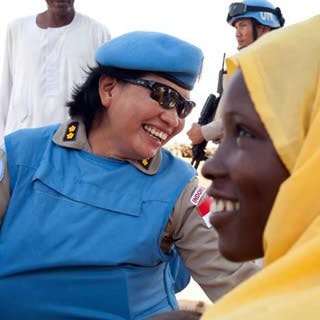 Last year, the UN showed its ability to respond nimbly to unfolding crises around the globe, particularly in the critical role that peacekeepers played — are playing — in containing and even reversing conflicts in some of the toughest corners of the world. However, just as peacekeeping is proving its worth, Congress and the Administration have decided to cut U.S. support for UN peacekeeping by 12 percent.
Last year, the UN showed its ability to respond nimbly to unfolding crises around the globe, particularly in the critical role that peacekeepers played — are playing — in containing and even reversing conflicts in some of the toughest corners of the world. However, just as peacekeeping is proving its worth, Congress and the Administration have decided to cut U.S. support for UN peacekeeping by 12 percent.
In South Sudan, UN peacekeepers are working to keep a spiraling conflict from further devolving. In the Democratic Republic of Congo, a UN peacekeeping “intervention brigade” with a mandate to directly support the Congolese military has quelled a brutal insurgency. Meanwhile, the UN peacekeeping force in Mali is supporting French forces, placing Al Qaida-aligned rebels on the defensive and helping to restoring civilian rule after Mali-based insurgents killed three Americans only a year ago.
Despite these successes, the 2014 federal spending bill newly signed into law reduces U.S. support for peacekeeping by roughly $400 million. This cut has major implications for the UN’s 15 peacekeeping operations and 116,000 deployed blue helmets around the world. Even as we are asking the UN to do more to advance our own national interests as well as the world’s, we are removing tools and resources they need to respond.
Moments like this define the role of the United Nations Association of the USA as a grassroots organization. It is time for Americans who believe in the fundamental peacekeeping role of the UN to stand up for the UN blue helmets who stand on the line in the most dangerous regions of the world.
To learn more on how we’re standing up for UN peacekeeping, click here.



 View All Blog Posts
View All Blog Posts